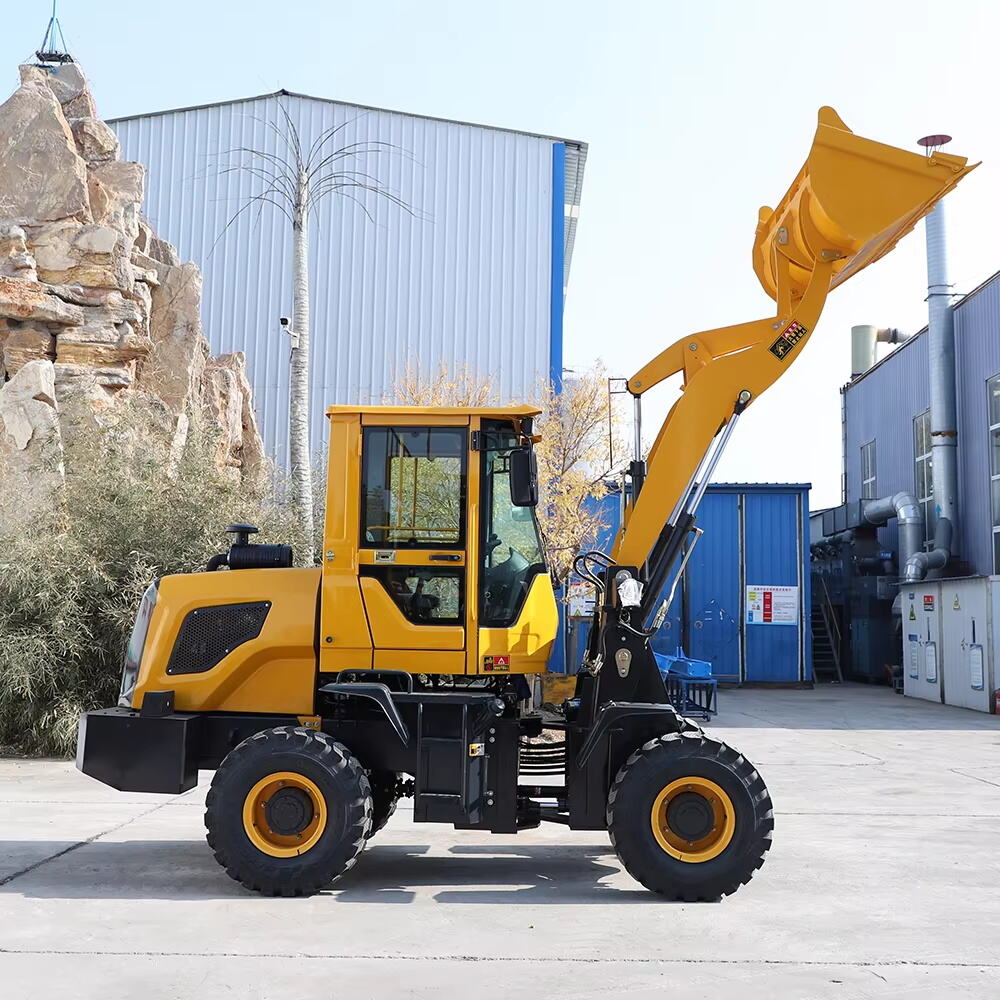Колесные погрузчики стали незаменимыми силовыми установками в строительной отрасли, произведя революцию в способах обращения, транспортировки и управления материалами на строительных площадках по всему миру. Эти прочные машины сочетают впечатляющую мощность с удивительной маневренностью, что делает их необходимым оборудованием для строительных проектов любого масштаба. Их способность адаптироваться к различным задачам и условиям эксплуатации сделала их одними из самых ценных активов в любом строительном парке.
От небольших жилых проектов до крупных промышленных объектов, погрузчики на пневмоколесном ходу демонстрируют непревзойденную гибкость в решении разнообразных задач. Их конструкция включает передовые инженерные принципы, которые позволяют им эффективно выполнять несколько функций, в конечном итоге повышая производительность и снижая эксплуатационные расходы для строительных компаний.
Настоящая универсальность фронтального погрузчика заключается в его способности использовать различные навесные орудия. Современные фронтальные погрузчики оснащены системами быстрого подключения, которые позволяют операторам менять инструменты за считанные минуты. От стандартных ковшей до специализированных приспособлений, таких как вилы для поддонов, захваты и снегоочистители, эти машины могут менять свою функциональность, чтобы соответствовать конкретным требованиям выполняемых работ.
Гидравлические системы фронтальных погрузчиков спроектированы таким образом, чтобы обеспечивать оптимальное распределение мощности между навесными орудиями, гарантируя стабильную производительность независимо от используемого инструмента. Такая адаптивность делает фронтальные погрузчики чрезвычайно ценными в разные сезоны и при выполнении различных типов проектов, максимизируя рентабельность инвестиций строительных компаний.
Погрузчики с колесным ходом оснащены шарнирно-сочлененной системой управления, которая обеспечивает высокую маневренность в ограниченном пространстве. Шарнирное соединение между передней и задней частями позволяет этим машинам перемещаться в стесненных условиях, сохраняя устойчивость при тяжелых нагрузках. Эта конструктивная особенность особенно полезна на городских строительных площадках, где часто ограничено пространство.
Сочетание мощных двигателей и хорошо спроектированных трансмиссий позволяет колесным погрузчикам эффективно перемещаться по различным типам местности. Независимо от того, работают ли они на бетонных поверхностях, пересеченной местности или наклонных поверхностях, эти машины сохраняют свою эффективность и надежность.

При проведении земляных работ фронтальные погрузчики превосходно справляются с выемкой, погрузкой и транспортировкой материалов по строительным площадкам. Их прочная конструкция позволяет эффективно обрабатывать значительные объемы почвы, гравия и других материалов. Способность сохранять высокий уровень производительности при перемещении между точками погрузки и разгрузки делает их незаменимыми для крупных земляных проектов.
Возможности по обработке материалов выходят за рамки базовых земляных работ, поскольку фронтальные погрузчики могут эффективно управлять строительными материалами, такими как трубы, пиломатериалы и сборные компоненты. Такая универсальность снижает необходимость использования нескольких специализированных машин на строительной площадке, что приводит к значительной экономии средств.
Дорожные строительные проекты в значительной степени выигрывают от универсальности погрузчиков на пневмоколесном ходу. Эти машины могут выполнять задачи от подготовки площадки до окончательной уборки. Возможность переключения между различными навесными орудиями делает их ценными для распределения сыпучих материалов, удаления мусора и помощи в укладке асфальта.
В зимние месяцы погрузчики на пневмоколесном ходу, оснащённые навесным оборудованием для уборки снега, становятся незаменимыми для обеспечения безопасности и доступности дорог. Такая сезонная адаптируемость гарантирует, что эти машины остаются продуктивными в течение всего года, независимо от погодных условий.
Современные погрузчики на пневмоколесном ходу оснащены сложными технологиями, которые повышают их универсальность. Системы GPS, автоматический контроль уклона и мониторинг производительности в реальном времени помогают операторам максимально повышать эффективность и точность. Эти технологические достижения превратили погрузчики на пневмоколесном ходу в интеллектуальные машины, способные выполнять сложные задачи с минимальным вмешательством оператора.
Телематические системы предоставляют ценную информацию об использовании техники, потребности в техническом обслуживании и эксплуатационной эффективности. Эти данные помогают строительным компаниям оптимизировать использование оборудования и поддерживать высокий уровень производительности на протяжении всего жизненного цикла машины.
Современные фронтальные погрузчики оснащены передовыми системами управления двигателем, которые оптимизируют расход топлива, сохраняя высокий уровень производительности. Переменные режимы мощности позволяют операторам подстраивать выходную мощность двигателя под конкретные задачи, снижая ненужный расход топлива и уровень выбросов.
Интеграция гибридных и электрических трансмиссий в новых моделях фронтальных погрузчиков демонстрирует приверженность отрасли экологической устойчивости без ущерба для универсальности. Эти экологически чистые варианты особенно ценны для проектов в экологически чувствительных районах или при наличии строгих требований к выбросам.
Многофункциональность фронтальных погрузчиков напрямую обеспечивает экономические преимущества для строительных компаний. Выполняя работу нескольких специализированных машин, один фронтальный погрузчик может значительно сократить затраты на приобретение и обслуживание оборудования. Возможность быстрого переключения между различными задачами минимизирует простои и максимизирует производительность.
Долгосрочные эксплуатационные расходы также снижаются благодаря эффективному расходу топлива и уменьшению потребности в обслуживании. Прочность современных фронтальных погрузчиков обеспечивает более длительный срок службы, что дополнительно повышает их экономическую ценность.
Многофункциональность фронтальных погрузчиков позволяет строительным компаниям оптимизировать распределение рабочей силы. Один оператор может выполнять различные задачи, для которых ранее требовалось несколько машин и специалистов. Эта эффективность в использовании трудовых ресурсов приводит к значительной экономии затрат на рабочую силу и улучшает управление проектами.
Требования к обучению упрощаются, поскольку операторам необходимо освоить только одну основную машину, а не несколько специализированных устройств. Это упрощение программ обучения снижает затраты и ускоряет развитие рабочей силы.
Оптимальный размер колесного погрузчика зависит от конкретных требований ваших строительных проектов. Средние по размеру колесные погрузчики, как правило, мощностью от 150 до 200 лошадиных сил, обеспечивают наилучший баланс мощности, маневренности и универсальности для общестроительных задач. Эти машины способны справляться с большинством типичных задач, оставаясь экономически выгодными в эксплуатации и обслуживании.
Современные погрузчики с ковшом спроектированы так, чтобы эффективно работать в различных погодных условиях. Они оснащены кабинами с климат-контролем, шинами, подходящими для всех типов погоды, и надежными гидравлическими системами, которые обеспечивают производительность в условиях экстремальных температур. Однако операторы должны соблюдать рекомендации производителя по эксплуатации в холодную погоду и принимать соответствующие меры предосторожности во время суровых погодных условий.
Регулярное техническое обслуживание имеет решающее значение для поддержания универсальности погрузчика с ковшом. Оно включает ежедневные проверки уровня жидкостей, состояния шин и соединений навесного оборудования, а также плановые интервалы обслуживания двигателя, проверки гидравлической системы и структурные осмотры. Соблюдение графика технического обслуживания, рекомендованного производителем, помогает обеспечить надежную работу и продлить срок службы оборудования.
 Горячие новости
Горячие новости2024-10-31
2024-10-28
2024-10-25
2024-10-23
2024-10-21
2024-09-03